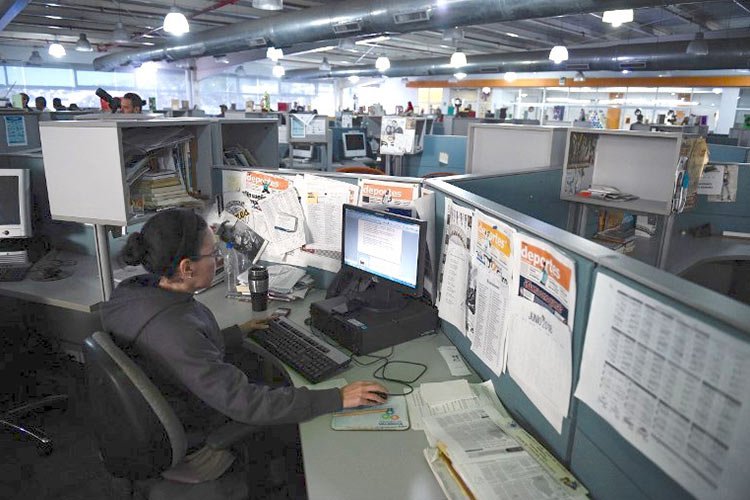‘AI Journalism’ set to create a new revolution in the media industry


A journalist works at the newsroom. File/ AFP
Live reports will be broadcasted by the “anti-inflammable” flying robot directly from California’s forest fires, and from the bottom of an ocean where cleaning works are ongoing on thousands of tons of plastic waste.
"AI Journalism” will create a new revolution in the media industry, where there are no geographic or legal borders, no restrictions imposed by governments on the freedom of News broadcasting and to access to information. Competition will be very strong, the winner of the race will be the one who gets those opportunities, and has the latest modern technologies, and can integrate them into the media industry, but unfortunately the third world countries will become a market penetrated by all these channels using modern technologies to spread the information by the media and "AI Journalism".
In “AI Journalism” there is no room for suppressing the revolutions by peoples, or hide disasters and accidents in some countries. There will be satellites, and media’s legions of “robots” that will be ready at any time to reach anywhere.
“AI Journalism” will be dozens of times faster than social media and will be more accurate, more detailed in covering the events.
It’s obvious now what the term “AI Journalism” means. It complements the development of the media industry since the era of the first industrial revolution, and then the great progress in the media industry with the Third Industrial Revolution, relying on the computer and the internet, and the subsequent emergence of the citizen’s press, where everyone has the ability to broadcast, stream and Live News at the time it occurs.
“AI Journalism” is another new term that has not been used by many, and it will replace citizen journalism and coincide with the techniques of 4IR, where the media will seek to use the techniques of AI and 4IR to the fullest in terms of: relying on the latest satellites that penetrate the Internet speed to beyond 1000 MB and the use of 3D cameras in a superior, clearer and more comprehensive way than the naked eye, alongside thousands of robots covering events in the most dangerous places, such as war zones, fires, seabed, in space, and above the skyscrapers.
Reuters News Agency has already begun the first steps in enabling AI techniques to perform certain tasks in the news industry. It has built the “Cybernetic Newsroom” called “Lynx Insight”, where the AI tool has already been used by multiple journalists, and Reuters is in the process of rolling it out across all its offices. The tool will assist journalists in curating stories from around the internet, suggesting ideas, analysing data and even write complete sentences if required.
“AI Journalism” is the future of the media and the world must be aware of the role that the 4IR can play in enabling AI to that industry, and providing tools such as 3D printing, Augmented Reality technology and Blockchain which will have a significant impact on the media industry over the next two decades.



